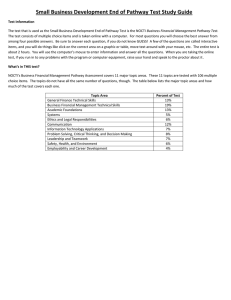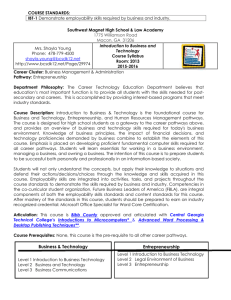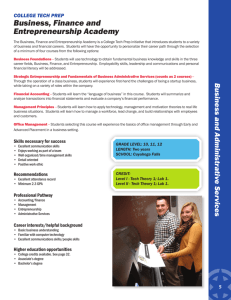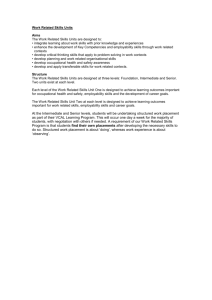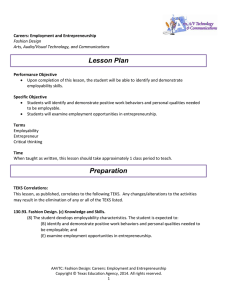Pathway - Forsyth County Schools
advertisement
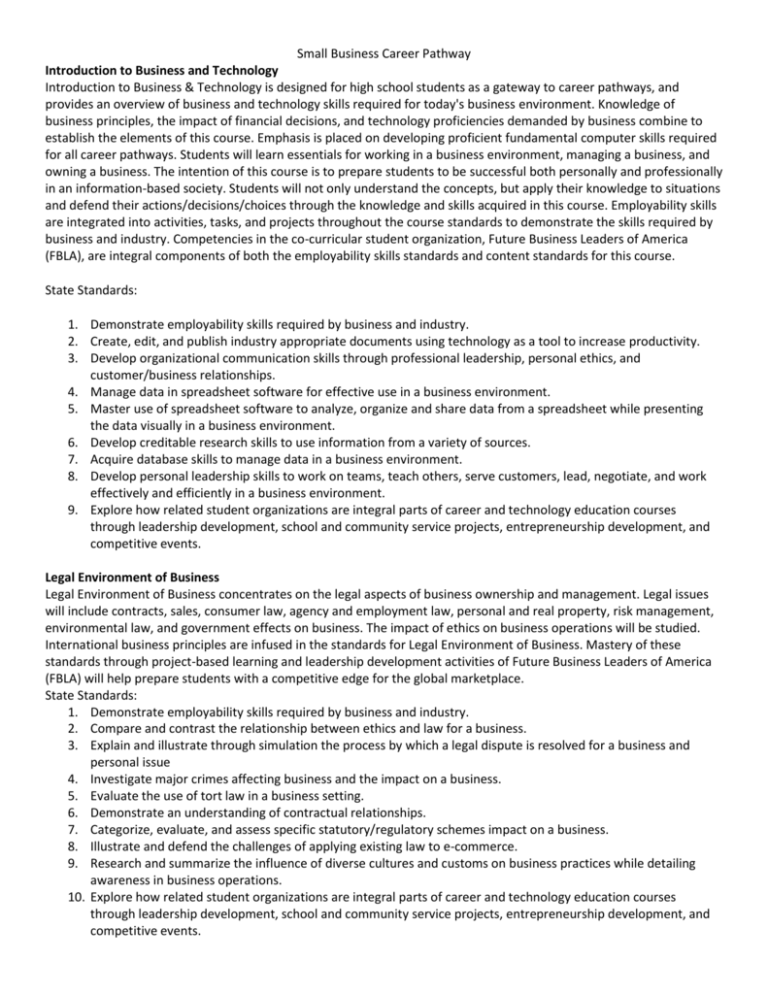
Small Business Career Pathway Introduction to Business and Technology Introduction to Business & Technology is designed for high school students as a gateway to career pathways, and provides an overview of business and technology skills required for today's business environment. Knowledge of business principles, the impact of financial decisions, and technology proficiencies demanded by business combine to establish the elements of this course. Emphasis is placed on developing proficient fundamental computer skills required for all career pathways. Students will learn essentials for working in a business environment, managing a business, and owning a business. The intention of this course is to prepare students to be successful both personally and professionally in an information-based society. Students will not only understand the concepts, but apply their knowledge to situations and defend their actions/decisions/choices through the knowledge and skills acquired in this course. Employability skills are integrated into activities, tasks, and projects throughout the course standards to demonstrate the skills required by business and industry. Competencies in the co-curricular student organization, Future Business Leaders of America (FBLA), are integral components of both the employability skills standards and content standards for this course. State Standards: 1. Demonstrate employability skills required by business and industry. 2. Create, edit, and publish industry appropriate documents using technology as a tool to increase productivity. 3. Develop organizational communication skills through professional leadership, personal ethics, and customer/business relationships. 4. Manage data in spreadsheet software for effective use in a business environment. 5. Master use of spreadsheet software to analyze, organize and share data from a spreadsheet while presenting the data visually in a business environment. 6. Develop creditable research skills to use information from a variety of sources. 7. Acquire database skills to manage data in a business environment. 8. Develop personal leadership skills to work on teams, teach others, serve customers, lead, negotiate, and work effectively and efficiently in a business environment. 9. Explore how related student organizations are integral parts of career and technology education courses through leadership development, school and community service projects, entrepreneurship development, and competitive events. Legal Environment of Business Legal Environment of Business concentrates on the legal aspects of business ownership and management. Legal issues will include contracts, sales, consumer law, agency and employment law, personal and real property, risk management, environmental law, and government effects on business. The impact of ethics on business operations will be studied. International business principles are infused in the standards for Legal Environment of Business. Mastery of these standards through project-based learning and leadership development activities of Future Business Leaders of America (FBLA) will help prepare students with a competitive edge for the global marketplace. State Standards: 1. Demonstrate employability skills required by business and industry. 2. Compare and contrast the relationship between ethics and law for a business. 3. Explain and illustrate through simulation the process by which a legal dispute is resolved for a business and personal issue 4. Investigate major crimes affecting business and the impact on a business. 5. Evaluate the use of tort law in a business setting. 6. Demonstrate an understanding of contractual relationships. 7. Categorize, evaluate, and assess specific statutory/regulatory schemes impact on a business. 8. Illustrate and defend the challenges of applying existing law to e-commerce. 9. Research and summarize the influence of diverse cultures and customs on business practices while detailing awareness in business operations. 10. Explore how related student organizations are integral parts of career and technology education courses through leadership development, school and community service projects, entrepreneurship development, and competitive events. Small Business Career Pathway Entrepreneurship 06.41600 How do you turn an idea into a business? Experience just that in this course! Entrepreneurship focuses on recognizing a business opportunity, starting a business, operating and maintaining a business. Students will be exposed to the development of critical thinking, problem solving, and innovation in this course as they will either be the business owner or individuals working in a competitive job market in the future. Integration of accounting, finance, marketing, business management, legal and economic environments will be developed throughout projects in this course. Working to develop a business plan that includes structuring the organization, financing the organization, and managing information, operations, marketing, and human resources will be a focus in the course. Engaging students in the creation and management of a business and the challenges of being a small business owner will be fulfilled in this course. Various forms of technologies will be used to expose students to resources and application of business principles for starting, operating and maintaining a business. Professional communication skills and practices, problem-solving, ethical and legal issues, and the impact of effective presentation skills are enhanced in this course to prepare students to be college and career ready. Employability skills are integrated into activities, tasks, and projects throughout the course standards to demonstrate the skills required by business and industry. Competencies in the co-curricular student organization, Future Business Leaders of America (FBLA), are integral components of the employability skills standard for this course. Entrepreneurship is the third course in the pathway in the Business Management & Administration Cluster. Students enrolled in this course should have successfully completed Introduction to Business & Technology and Legal Environment of Business. After mastery of the standards in this course, students should be prepared to take the end of pathway assessment in this career area State Standards: 1. Demonstrate employability skills required by business and industry. 2. Relate concepts and processes associated with entrepreneurial success and the personal traits and behaviors associated with successful entrepreneurial performance. 3. Use and model concepts, strategies, and systems needed to interact and present effectively to others. 4. Apply fundamental business concepts that affect business decision making. 5. Explain and detail legal form of business ownership and the impact of government’s role on business. 6. Understand and apply the basic economic principles and concepts fundamental to entrepreneurship. 7. Develop a marketing plan to identify, reach, and retain customers in a specific target market. 8. Analyze financial issues relating to successful business ownership. 9. Manage and operate a business (or simulate the management and operation) through daily tasks and activities of a small business. 10. Research, develop, and present a business plan. 11. Explore how related student organizations are integral parts of career and technology education courses through leadership development, school and community service projects, entrepreneurship development, and competitive events.


